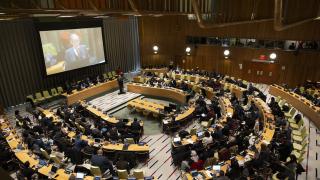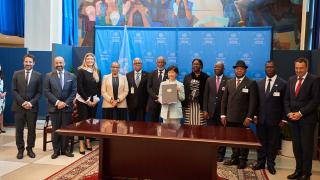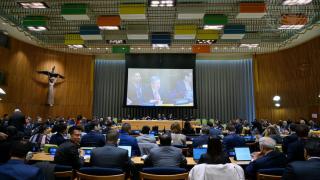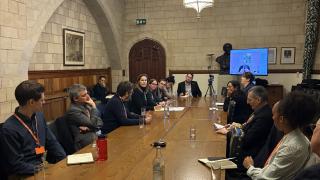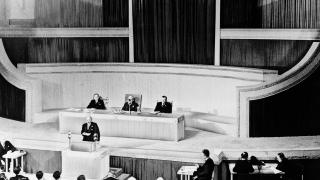
On 24 October 2020 - the UN's 75th birthday - the Treaty on the Prohibition of Nuclear Weapons (TPNW) gained its 50th ratification meaning that this ground-breaking Treaty which comprehensively prohibits nuclear weapons and related activities will become legally-binding international law 90 days later on 22 January 2021.
Following tireless campaigning by civil society, mayors, faith leaders and nuclear weapons survivors under the banner of the International Campaign to Abolish Nuclear Weapons (ICAN), the TPNW was created in 2017 with the support of 122 countries – two thirds of the UN’s membership. Given the international prohibitions on biological and chemical weapons created in the second half of the 20th century, the international community has now successfully addressed the lack of a corresponding treaty to ban the other major class of weapons of mass destruction: nuclear weapons.
The Treaty is a legally binding prohibition that will not only create an ever-growing patchwork of sovereign nuclear weapons-free zones, but also require States Parties not to assist the weapons programmes of nuclear armed States or support the concept of nuclear deterrence. The Treaty addresses the catastrophic humanitarian and environmental consequences of nuclear weapons and takes the approach that nuclear weapons are a concern of for all people in all countries, not just those in possession of these weapons. Alongside the prohibitions, the Treaty provides recourse to assistance for individuals affected by the use or testing of nuclear weapons, as well as measures for environmental remediation.
The entry into force of the TPNW will bring significant pressure to bear on the UK Government, which does not currently support the Treaty.
Analysis on the UK's relationship with the TPNW
While the UK is committed to nuclear disarmament under the Non-Proliferation Treaty (NPT) - a Treaty it views as the “cornerstone” of nuclear security – it’s approach to the TPNW, which clearly complements the fundamental objectives of the NPT, has been combative.
Rather than engaging with the process, the UK has variously boycotted, protested and dismissed the TPNW, the negotiations which led to it, and those supporting it. The UK’s failure to participate in the string of multilateral discussions on nuclear disarmament, including those mandated by the UN, is irreconcilable with its international obligations under Article 6 of the NPT which requires the UK to participate in negotiations on disarmament in “good faith”. Such boycotts were also at odds with the outcome document of the 2010 NPT Review Conference (which the UK itself signed up to).
Most concerningly, the UK’s repeated labelling of the TPNW as a "divisive initiative" will itself serve to deepen divisions and make it harder to reach consensus agreements on nuclear security in other multilateral forums, such as the NPT. By erroneously casting the TPNW as a threat to the NPT rather than embracing the ways it can contribute to disarmament, the UK is guilty of what it accuses TPNW supporters of doing: undermining the NPT.
Such actions demonstrate little awareness of the reason for the TPNW’s emergence – namely the widely perceived failure of nuclear weapons states to make sufficient progress on their disarmament commitments. The UK’s inflammatory actions also puts it unequivocally at odds with UN guidance on the issue. A statement made by UN High Representative on Disarmament Affairs, speaking in Parliament at an event organised by UNA-UK, implored nuclear weapons states to desist from undermining the TPNW, saying: “don’t ignore it, don’t attack it.
Irrespective of the UK Government’s position, the TPNW’s impact will be felt. Cities, local authorities and mayors are getting behind the Treaty and renouncing their political support for the UK’s nuclear weapons industry and the stockpiling and movement of hazardous materials it necessitates. The Scottish Government publicly endorses the Treaty. Major banks, pension funds and sovereign wealth funds across Europe are divesting from nuclear weapons and related industries. Internationally, UK’s divisive approach to a process supported by a majority of UN Member States damages the UK’s standing and puts strain on the UK’s relations with a large swathe of the international community.
In an article published by the Byline Times, UNA-UK’s Head of Campaigns Ben Donaldson commented:
“The ground is moving under the UK’s feet. Whether or not the UK supports the UN Treaty on the Prohibition of Nuclear Weapons, the impact will be felt. The Treaty is popular with States the UK is looking to strike trade deals with and the UK is finding itself increasingly diplomatically isolated on this issue. As well as being immoral, the UK’s current position of variously ignoring and attacking the Treaty and its supporters is unsustainable. A large majority of countries have made it clear they have lived in fear of nuclear fallout for too long and want action.”
The UK and its nuclear allies are clearly feeling the pressure. Earlier this week the US sent a letter to States that have ratified the TPNW urging them to withdraw their support.
UNA-UK has consistently argued that the UK should start engaging constructively with the TPNW, a position echoed by a 2019 cross-party report by the Lords Committee on International Relations. In the short term this means recognising the strengthening effect the TPNW can have on the NPT, committing to attend Meetings of States Parties as an observer and voluntarily begin implementing the Treaty's measures to assist affected individuals and remediating the environment. More broadly the UK should explain at the earliest opportunity how it intends to make progress on its international obligation to disarm and announce its future intention to join the TPNW.
Seventy-five years after London hosted the first UN meetings where General Assembly Resolution 1(1) called for a world free of nuclear weapons, there is now a powerful new tool to help make this a reality.
UNA-UK is a proud UK partner of the Nobel Prize-winning ICAN coalition and has campaigned on nuclear disarmament since its founding in 1945.
Image: Prime Minister Clement Attlee addresses the opening session of the United Nations Organization's General Assembly at Methodist Central Hall Westminster in London in January 1946. The Assembly's first resolution was in support of nuclear disarmament (c) UN Photo
UNA-UK’s evidence to the Foreign Affairs Committee
UNA-UK’s evidence to the Lords IR committee
Read more about UNA-UK’s recommendations
Read Together First's Stepping Stones report recommending progress on disarmament


